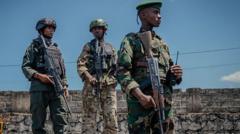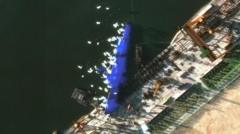American military officials are sounding alarms about the escalation of U.S. military operations in Yemen, warning that ongoing conflicts are depleting critical armaments that could be needed to counter threats posed by China. With President Trump's recent orders leading to intensified airstrikes in Yemen, resources are being diverted from stockpiles in the Asia-Pacific region, a strategic concern for U.S. defense.
U.S. Military Faces Arms Strain Amid Yemen Campaign and China Tensions

U.S. Military Faces Arms Strain Amid Yemen Campaign and China Tensions
Concerns grow within the Pentagon as military readiness in the Asia-Pacific is jeopardized by resource allocation to the Middle East.
Since the onset of the Israel-Gaza conflict in October 2023, the Pentagon has increased its military presence in the Middle East. This includes two aircraft carriers and additional stealth bombers, as well as missile defense systems deployed to protect U.S. interests amid regional turmoil sparked by Houthi militia actions against maritime vessels in the Red Sea. The concentration of military assets in this region has resulted in a heightened operational demand on U.S. naval and air forces, complicating maintenance and readiness efforts.
In a rare look behind the scenes, congressional aides have disclosed that the high tempo of operations is stretching resources thin, revealing concerns that the Pentagon may need to source munitions from its reserves in Asia if operations in Yemen continue to escalate. The dialogues, held under the condition of anonymity, highlight the stress military operations impose not just on hardware but also on personnel maintaining these vital systems.
Admiral Samuel Paparo, who heads the Indo-Pacific Command, is poised to face questioning on this pressing issue during his forthcoming congressional testimony. Lawmakers are expected to explore the implications of resource allocation and potential risks to national security in light of these escalating international tensions.
As military leaders assess operational readiness, the broader ramifications of U.S. engagements in regions like Yemen are becoming increasingly evident, prompting a critical examination of strategic priorities amid potential confrontation with China's military ambitions.
In a rare look behind the scenes, congressional aides have disclosed that the high tempo of operations is stretching resources thin, revealing concerns that the Pentagon may need to source munitions from its reserves in Asia if operations in Yemen continue to escalate. The dialogues, held under the condition of anonymity, highlight the stress military operations impose not just on hardware but also on personnel maintaining these vital systems.
Admiral Samuel Paparo, who heads the Indo-Pacific Command, is poised to face questioning on this pressing issue during his forthcoming congressional testimony. Lawmakers are expected to explore the implications of resource allocation and potential risks to national security in light of these escalating international tensions.
As military leaders assess operational readiness, the broader ramifications of U.S. engagements in regions like Yemen are becoming increasingly evident, prompting a critical examination of strategic priorities amid potential confrontation with China's military ambitions.





















